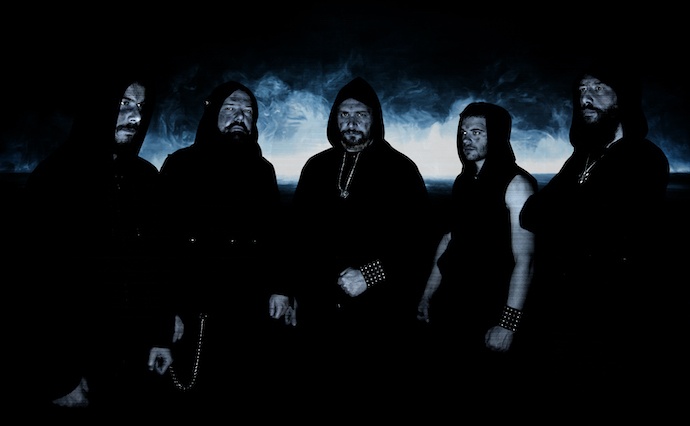
(On May 14th Floga Records will release the second album of the Greek black metal band Synteleia, and in anticipation of that Comrade Aleks got in touch with the band’s vocalist and lyricist Nyctelios, and we present their conversation today.)
According to the official press release, Synteleia’s new album The Secret Last Syllable is the natural successor to their debut album Ending of the Unknown Path. You maybe heard it back in 2019 – an honest example of mysterious Hellenic black metal. Now the band return with “nine mystical songs thematically based on the Cthulhu Mythos by H.P. Lovecraft and The Necronomicon”, and that’s enough for me. Cthulhu R’lyeh wgah’nagl fhtagn, brothers and sistres! Cthulhu fhtagn!
So we have these new nine hymns in the name of macabre gods and we have their author Nyctelios (vocals, lyrics) here, to spread Synteleia’s blasphemous knowledge.
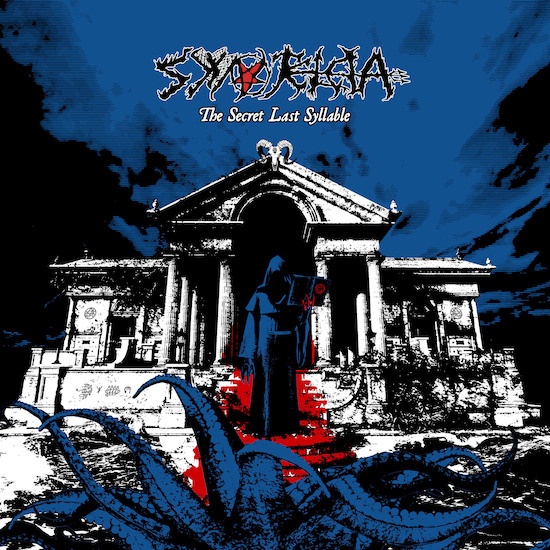
Hail Nyctelios! How are you doing? I think that the media is overfilled with the flow of bad news, so let’s try to focus on music.
Unfortunately, that is true, we are all trapped lately in a spiral vortex of bad news, mostly with the pandemic and its variants and now with the devastating developments of war, deeply impairing our lives, but we can take a short break here and talk about music. We are currently expecting our second full-length album, The Secret Last Syllable, to be released on May 14th, 2022, and so, in spite of the broader context of our lives nowadays being rather obscure and pessimistic, we have found our way out of it through the path of music creation. So, we are very excited about our new album and look forward to its official release and the feedback we get from the metal audience worldwide.
Synteleia was formed in 2015. What drove you to gather and choose black metal as your way to express your ideas?
Our musical background drives from the traditional heavy metal movement of the ’80s. However growing up in the early ’90s, with the flourishing of the second world wave of the black metal genre, in which the Greek scene at that time had a significant leading role, and us being teenagers back then, witnessing this whole outburst, we couldn’t have moved to any other direction, rather than Hellenic Black Metal. It has passed through our musical genome, follows us and identifies us since then.
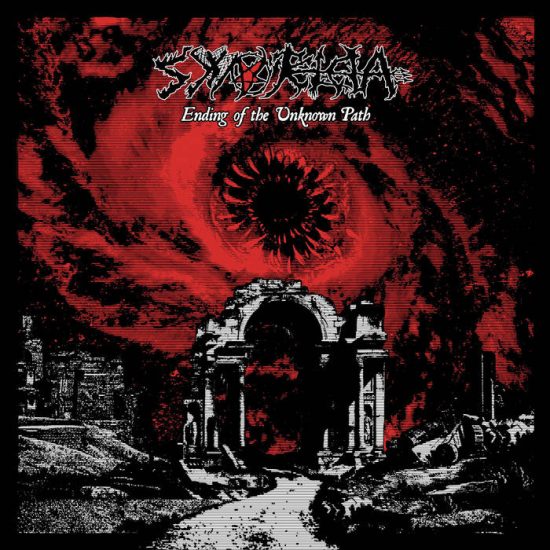
Hellenic Black Metal is a kind of separate scene. How do you see its features? What do you think influenced its development?
We think that the warmth of the Mediterranean musical culture that characterizes the Hellenic Black Metal genre, together with the technical, melodic riffs, and the mid-slow tempo rhythms, are its noticeable difference from the Scandinavian scene that flourished at the same time with the emblematic bands of the early ’90s.
This different approach in relation to the northern countries paved a different, distinct identity in this music genre and gave it a holistic worldwide recognition and great support from metal fans over the years.
Greek culture is rich with its own deities and monsters, but I don’t remember if it’s a widespread influence for the bands. How widespread is it? The first name which jumps in my mind is Kawir, then Zemial, a bit of Varathron maybe?
Indeed, that’s true. Greek culture is an endless pool of inspiration, regarding its ancient legends and mythological tales, but it’s not an exclusivity that only Greek bands have. Iron Maiden and Metallica have taken a dip into it, plus numerous bands worldwide. Lots of Greek bands have dealt with the theme, either occasionally or in depth, but Kawir is a great representative, dealing solely with ancient Greek myths and given that their lyrics are in ancient Greek as well.
SYNTELEIA – “HARVEST THE FOREST”
How do you see the current black metal scene in Greece? Do you feel people’s support? Do you have a kind of brotherhood there? Or is it rather a gathering of individuals?
There’s been a huge outburst in the Greek black metal scene over the past few years, resulting in many great albums produced that drive the movement forward. The bands have formed bonds with one another, breaking domestic barriers and making known that the Greek scene is as strong as ever. Peoples’ excitement is obvious and their support encouraging for bands to go on, doing what they love best.
You demonstrated your dedication to Lovecraftian lore with the very first demo Astral Blasphemies (2016) and further on the debut full-length album Ending of the Unknown Path (2019). What was your first encounter with H.P.’s stories in metal?
Our first listening and encounter of metal music with Lovecraftian content were from classic heavy metal bands, such as Metallica with “The Call of Ktulu” and Iron Maiden‘s cover of the Live After Death live album. Therefore, having, since adolescence, dealt with the Cthulhu Mythos to a large extent, reading almost the whole bibliography of H.P. Lovecraft and the occult apocryphal book of “Necronomicon“, together with various occult grimoires, it was almost inevitable that lyrically we would deal in our discography with this obscure, but so beloved by lots of people, thematic.
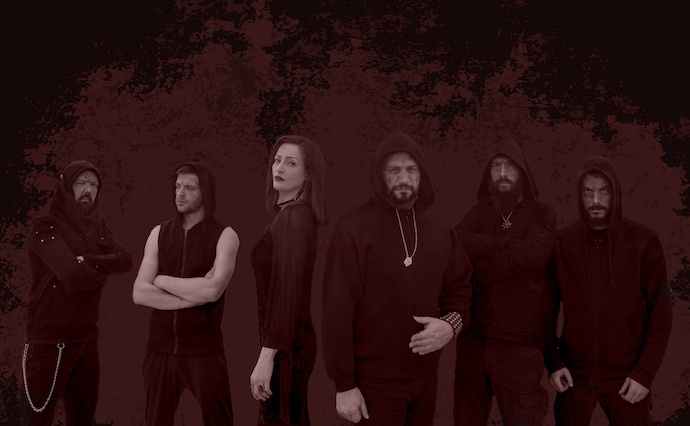
There were five men in Synteleia from the start, but it seems you had line-up problems further on. What was a common problem? Didn’t the band’s ex-members believe zealously enough in the ‘Ancient Gods’?
Although not many changes, it’s quite common for band members to leave and be replaced by others, and we are no exception to that. Personal reasons, as life is unpredictable as it is and such. Nothing personal and definitely nothing to do with the Ancient Gods! (laugh).
The main issue we had as a band, in terms of our line-up, was having a permanent drummer. In our demo era (2015-2016), we had Oort as a drummer, a friend from the affiliate band Plague, who later left for personal reasons and so we had to move to a session drummer for the live concerts we had already arranged. We collaborated with a well-known session drummer, Nick Yngve, one of known value and contribution in our first official releases, but also in our first live appearances. However, in our next opus, we wanted to have a full member as a drummer putting Synteleia as his priority, so, Amdusias, who had contributed to our rehearsal demo Astral Blasphemies of 2016 as a guitarist at the time, came back to the band. Amdusias, in our new album The Secret Last Syllable, has put his own, characteristic “signature” and feeling on the drums, resulting to an outcome that fully justified our decision. The added value of his integration into the band can be also seen in the production, as he took over much of it, but also compositionally being a complete, multidimensional musician.
What are your memories about the Ending of the Unknown Path recording session? Was it your first big studio experience?
Yes, indeed it was and an unforgettable one! Since our beginning in 2016 with the Astral Blasphemies demo, being a live rehearsal recording, we wanted on our next step, namely our first full-length, to have a much more professional sound and production. That is why we collaborated with remarkable contributors and music engineers and this solid result emerged in our debut. We always want to evolve musically, in every step we take. Today, 6 years later, without losing rage, momentum, and appetite, we are in 2022 with a second full-length album, The Secret Last Syllable, which reveals this musical evolution and the mood to elevate to new musical levels, focusing on the atmosphere, the unique melodies, the solid compositions, and all the elements that make up our own musical imprint.
So, back to your question, Ending of the Unknown Path‘s production period will always have a special place in our hearts, as we collaborated with 3 different studios for the recordings of instruments and vocals and we also made an unforgettable trip to the city of Ioannina, where Achilleas Kalantzis of “Sun Cord Audiolab” is based, who mixed and mastered our debut album. The whole production process at that time made us richer in knowledge, emotions, and socializing with excellent music producers of our scene.
How do you usually write songs? The band has a clear concept, so I bet that the lyrics appear first, and Lovecraft’s stories are known for their atmosphere of unavoidable madness and horror. How do you work on this part of your songs?
You guessed right. First, we start with the writing of the lyrics which I undertake. Our lyrics are based on Cthulhu Mythos and the Lovecraftian background of cosmic horror and madness as you commented, rendered with anguished narration, ritualistic and occult atmosphere, and dark, morbid aesthetics, to add our own flavor. On this canvas, we then begin to compose the songs, putting the initial ideas in riffs, main rhythm melodies and bridges between those riffs, adding drums and atmospheric synths and slowly unfolding the whole musical part, while experimenting and meddling until we reach the final result, which has as a greater end to faithfully convey the atmosphere of our own narrative.
We all contribute synthetically, either with solid compositions, or with ideas that we integrate in the already existing demos, under the scope that is strongly dictated to us by our thematic lyrics and the atmosphere we want to attribute to it.
Which aspects of Synteleia music benefit your work with the atmosphere of Lovecraft’s stories?
We try to adapt our music, as best as possible, to match the atmosphere of an album, not the other way around. Given the theme, comes the music, evolving and transforming on every work we present.
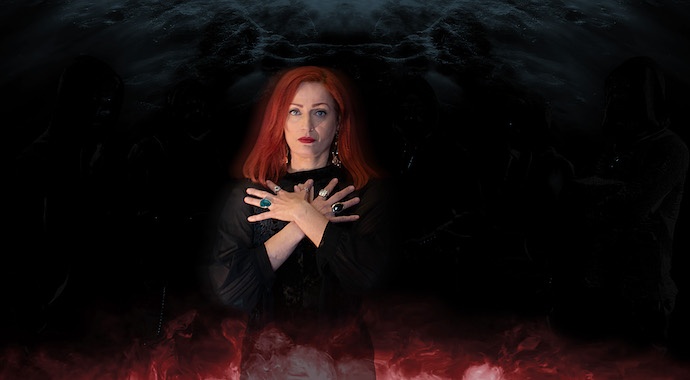
guest soprano vocalist Mina Morfi
Floga Records has your second album The Secret Last Syllable in their schedule; it shall be released in May. I see that you recorded this material in a sole studio. Was it more difficult in comparison with the recording of Ending of the Unknown Path?
We wanted to keep things simple, in every aspect, with the pandemic and all, not being able to move and travel like we used to, so we recorded all the instruments and vocals in one place, the “Black Siren” studio, where we had recorded guitars and bass for our debut album. Its owner and producer, Marios Kalavasis, really did his best, making everything easier for all, providing us with as much time and space as we could get, as he dedicated fully to the project and our expectations, so that we could get to the level of sound and atmosphere we wanted. This endeavour gave us the opportunity to work more closely as a band, both compositionally and production-wise, resulting in a noticeable difference from our first album.
What is the most difficult song for you in The Secret Last Syllable? Did you face any problems in the studio during recording of these songs?
In terms of vocals, the most demanding part is the “Escaping Atheron” track, which has a lot of lyrics and continuous alternations from deep, low-pitched growling vocals to harsh, guttural, shrieking ones, getting the vocal cords to the extreme. Another difficult parameter that I recall is recording vocals in August, with temperatures of 45 degrees Celsius here in Athens, while inside it felt like 100… (laughs). Equally demanding was the recording of the drums, as it was also done during summer, resulting in our drummer to actually lose weight(!), plus the fact that we used the concert toms technique, another difficult prospect to handle, in order to get an old-school result for the mixing process.
Are all of your lyrics connected with Lovecraft’s myths? Did you ever use stories of his followers for your songs?
We are currently dwelling in the Cthulhu Mythos theme, created by the father of horror literature, H.P. Lovecraft, but also enriched by his followers that supported that movement. We also incorporate several personal narratives and storytelling, sometimes dreamlike, sometimes nightmarish, profoundly based on dystopian situations and the call of the “Great Old Ones” to reclaim their dominance on earth or the depiction of their malevolent manifestation in mystical occult rites that lead to ritualistic sacrifices. At an atmospheric level, mysterious, agonizing, and ritualistic situations are mostly depicted, as each song has a different storytelling in first or third person, making it a stand-alone occult story in the path that H.P. Lovecraft paved. In that sense, lyrics throughout our projects up ’til now, point to us how to build up the atmosphere of our songs. We have also used actual invocation verses of the Necronomicon in a ritualistic manner, in many of our songs.
From a personal aspect, I can tell you that the lyrics of “Harvest the Forest” in the new album, and I quote “The trees shivered sharply, terrible scent of sea emerged, archaic stone of the altar, buried by myriad pseudo-mussels…” were derived from a nightmare I had one night, waking up in agony to write down the lyrics, narrating a mystical invocation of Cthulhu in a forest by the sea, by a vicious occult sect, known in the ancient catacombs as “Omega Alpha”. Iä! Iä! Cthulhu fhtagn!
Both albums were mastered by Achilleas Κalantzis who’s not only a member of Katavasia and Varathron but also a sound engineer with good experience. How tightly did you communicate with him during the last stages of your work over albums?
The first album was solely produced by Achilleas, while the second one he just mastered. The partnership with Achilleas in both projects was excellent. He is truly professional at his core and an expert when it comes to mastering, in Greece and abroad. In the first production, we traveled to his base at Ioannina city, in order to witness ourselves the stage of production in its whole and to establish a closer, interpersonal collaboration. In the second production, due to the pandemic, we cooperated remotely, but the result was just as impressive and solid.
A year ago you took part in a split-album with your countrymen Funeral Storm, who also tend to proclaim the will of Lovecraftian gods. How would you compare their vision of Mythos and the things you do with Synteleia?
The split The Ancient Calling that we released last March with Funeral Storm, is a collectible one. The artwork style on the cover and the back refers to the old nostalgic times of the early ’90s, and the acceptance from the scene and the metal community, in general, was excellent, as both bands sold out all our stock! For us Synteleia was the “aftermath” of Ending of The Unknown Path. As far as lyrics and incorporation of the Cthulhu Mythos is concerned, we are on the same page with Funeral Storm, both praising the Great Old Ones and the belief system known as The Cult of Cthulhu.
Okay, that was my last question Nyctelios, thanks for the interview. Let’s finish it with one last thing – what are your plans for the rest of 2022?
We thank you Aleks!
As far as 2022 is concerned, we plan to do as many live shows as possible and promote our new album as best as we can. In the meantime, gathering ideas and material for our next album is a priority as well.
Stay black, stay true!
https://flogarecords.com/store/product-category/pre-orders/

Cool interview. Synteleia is a new band for me and I like what I hear very much. Greek black metal has such a distinctive sound that distiguishes it from other types of black metal. He summed it up well.